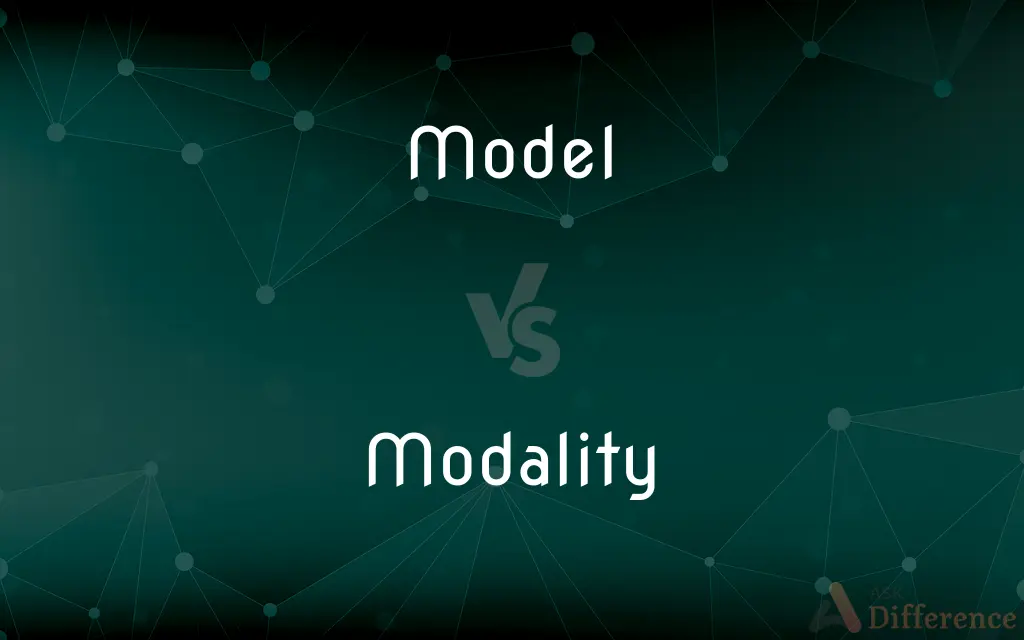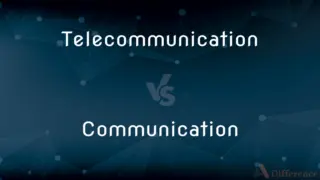Model vs. Modality — What's the Difference?
By Tayyaba Rehman & Maham Liaqat — Updated on April 4, 2024
A model is a representation or simulation of reality, used for analysis or education, whereas a modality refers to a method or way of doing something, especially within a specific field.

Difference Between Model and Modality
Table of Contents
ADVERTISEMENT
Key Differences
Models are simplifications or abstractions of complex realities, designed to help understand, predict, or control aspects of the world. Modalities, on the other hand, are methods, techniques, or approaches employed within specific contexts, such as learning, therapy, or communication.
While models are primarily tools for understanding, simulating, or predicting, modalities are about the application or implementation of methods within various practices. For example, in education, a model could be a theoretical framework for understanding student motivation, whereas a modality could refer to the use of multimedia tools in teaching to engage different learning styles.
The creation and application of models require a process of abstraction and simplification, where complex real-world phenomena are distilled into essential features that can be analyzed or manipulated. This process involves assumptions that may limit the model's applicability or accuracy but allows for focused study or exploration of specific dynamics within a controlled framework. In contrast, the choice of modality often depends on the specific needs, goals, or contexts of the situation.
Both models and modalities play crucial roles in their respective domains, but they serve different purposes. Models are indispensable for theory development, understanding complex systems, and predicting outcomes, whereas modalities are key to the practical application of knowledge, techniques, and interventions across various fields.
Comparison Chart
Definition
A representation or simulation of reality
A method or way of doing something
ADVERTISEMENT
Purpose
To understand, predict, or simulate
To apply methods or techniques
Application
Across various disciplines for analysis
Specific fields for implementation
Focus
On representing or simulating phenomena
On the method or approach used
Examples
Physical models, mathematical equations
Learning styles, treatment methods
Compare with Definitions
Model
A physical or visual representation of an object or system.
The architect created a scale model of the building to visualize the final design.
Modality
The type of action or operation involved in using a verb, often expressed through verb forms or auxiliaries.
The modalities of obligation and necessity are often conveyed through modal verbs like must and should.
Model
A standard or example for imitation or comparison.
The policy serves as a model for other nations looking to reform their healthcare systems.
Modality
A method of treatment in medicine, such as surgery, chemotherapy, or physical therapy.
The doctor recommended a combination of modalities to treat the patient's condition.
Model
A simplified representation of a system to study its properties or predict its outcomes.
Climate models are used to predict future weather patterns based on current data.
Modality
A sensory channel through which information is transmitted to the brain.
Educational strategies often incorporate multiple modalities to enhance learning.
Model
A conceptual framework or theory that explains certain phenomena.
The scientist proposed a new model of atom structure that better explains chemical reactions.
Modality
A particular mode in which something exists or is experienced or expressed.
Sign language is a crucial communication modality for many deaf individuals.
Model
An abstract mathematical representation of a process or concept.
The economist developed a model to explain market behavior under different conditions.
Modality
A specific method or technique used in therapy or counseling.
Cognitive-behavioral therapy is an effective modality for treating anxiety.
Model
A small object, usually built to scale, that represents in detail another, often larger object.
Modality
The fact, state, or quality of being modal.
Model
A preliminary work or construction that serves as a plan from which a final product is to be made
A clay model ready for casting.
Modality
A tendency to conform to a general pattern or belong to a particular group or category.
Model
Such a work or construction used in testing or perfecting a final product
A test model of a solar-powered vehicle.
Modality
(Logic) The classification of propositions on the basis of whether they assert or deny the possibility, impossibility, contingency, or necessity of their content. Also called mode.
Model
A schematic description or representation of something, especially a system or phenomenon, that accounts for its properties and is used to study its characteristics
A model of generative grammar.
A model of an atom.
An economic model.
Modality
Modalities The ceremonial forms, protocols, or conditions that surround formal agreements or negotiations
"[He] grew so enthusiastic about our prospects that he began to speculate on the modalities of signing" (Henry A. Kissinger).
Model
A style or design of an item
My car is last year's model.
Modality
(Medicine) A therapeutic method or agent, such as surgery, chemotherapy, or electrotherapy, that involves the physical treatment of a disorder.
Model
One serving as an example to be imitated or compared
A model of decorum.
Modality
(Physiology) Any of the various types of sensation, such as vision or hearing.
Model
One that serves as the subject for an artist, especially a person employed to pose for a painter, sculptor, or photographer.
Modality
The fact of being modal.
Model
One that serves as the basis for a fictional character or place.
Modality
(logic) The classification of propositions on the basis on whether they claim possibility, impossibility, contingency or necessity; mode.
Model
A person employed to display merchandise, such as clothing or cosmetics.
Modality
(linguistics) The inflection of a verb that shows how its action is conceived by the speaker; mood
Model
(Zoology) An animal whose appearance is copied by a mimic.
Modality
(medicine) A method of diagnosis or therapy.
Model
Being, serving as, or used as a model.
Modality
Any of the senses (such as sight or taste)
Model
Worthy of imitation
A model child.
Modality
(semiotics) A particular way in which the information is to be encoded for presentation to humans, i.e. to the type of sign and to the status of reality ascribed to or claimed by a sign, text or genre.
Model
To make or construct a descriptive or representational model of
Computer programs that model climate change.
Modality
(theology) The organization and structure of the church, as distinct from sodality or parachurch organizations.
Model
To plan, construct, or fashion in imitation of a model
Modeled his legal career after that of his mentor.
Modality
(music) The subject concerning certain diatonic scales known as musical modes.
Model
To make by shaping a plastic substance
Modeled a bust from clay.
Modality
(sociology) The way in which infrastructure and knowledge of how to use it give rise to a meaningful pattern of interaction (a concept in Anthony Giddens's structuration theory).
Model
To form (clay, for example) into a shape.
Modality
(legal) The quality of being limited by a condition.
Model
To display by wearing or posing in
Model clothes.
Modality
The quality or state of being modal.
Model
In painting, drawing, and photography, to give a three-dimensional appearance to, as by shading or highlighting.
Modality
A modal relation or quality; a mode or point of view under which an object presents itself to the mind. According to Kant, the quality of propositions, as assertory, problematical, or apodeictic.
Model
To exhibit (a behavior) in such a way as to promote the establishment of similar patterns of behavior in another
The therapist modeled socially appropriate conversation.
Modality
A classification of propositions on the basis of whether they claim necessity or possibility or impossibility
Model
To repeat (a behavior observed in another)
The child was modeling her mother's nurturing behavior.
Modality
Verb inflections that express how the action or state is conceived by the speaker
Model
To make a model.
Modality
A particular sense
Model
To work or serve as a model, as in wearing clothes for display or serving as the subject of an artist.
Modality
A method of therapy that involves physical or electrical therapeutic treatment
Model
A person who serves as a subject for artwork or fashion, usually in the medium of photography but also for painting or drawing.
The beautiful model had her face on the cover of almost every fashion magazine imaginable.
Model
A person, usually an attractive male or female that is hired to show items or goods to the public, such as items that are given away as prizes on a TV game show.
Model
A representation of a physical object, usually in miniature.
The boy played with a model of a World War II fighter plane.
Model
A simplified representation used to explain the workings of a real world system or event.
The computer weather model did not correctly predict the path of the hurricane.
Model
A style, type, or design.
He decided to buy the turbo engine model of the sports car.
This year's model features four doors instead of two.
Model
The structural design of a complex system.
The team developed a sound business model.
Model
A successful example to be copied, with or without modifications.
He was a model of eloquence and virtue.
British parliamentary democracy was seen as a model for other countries to follow.
Model
(logic) An interpretation function which assigns a truth value to each atomic proposition.
Model
(logic) An interpretation which makes a set of sentences true, in which case that interpretation is called a model of that set.
Model
(medicine) An animal that is used to study a human disease or pathology.
Model
Any copy, or resemblance, more or less exact.
Model
(software architecture) In software applications using the model-view-controller design pattern, the part or parts of the application that manage the data.
Model
Worthy of being a model; exemplary.
Model
(transitive) to display for others to see, especially in regard to wearing clothing while performing the role of a fashion model
She modelled the shoes for her friends to see.
Model
(transitive) to use as an object in the creation of a forecast or model
They modelled the data with a computer to analyze the experiment’s results.
Model
(transitive) to make a miniature model of
He takes great pride in his skill at modeling airplanes.
Model
(transitive) to create from a substance such as clay
The sculptor modelled the clay into the form of a dolphin.
Model
(intransitive) to make a model or models
Model
(intransitive) to work as a model in art or fashion
The actress used to model before being discovered by Hollywood.
Model
A miniature representation of a thing, with the several parts in due proportion; sometimes, a facsimile of the same size; as, a
In charts, in maps, and eke in models made.
I had my father's signet in my purse,Which was the model of that Danish seal.
You have the models of several ancient temples, though the temples and the gods are perished.
Model
Something intended to serve, or that may serve, as a pattern of something to be made; a material representation or embodiment of an ideal; sometimes, a drawing; a plan; as, the clay model of a sculpture; the inventor's model of a machine.
[The application for a patent] must be accompanied by a full description of the invention, with drawings and a model where the case admits of it.
When we mean to buildWe first survey the plot, then draw the model.
Model
Anything which serves, or may serve, as an example for imitation; as, a government formed on the model of the American constitution; a model of eloquence, virtue, or behavior.
Model
That by which a thing is to be measured; standard.
He that despairs measures Providence by his own little, contracted model.
Model
Any copy, or resemblance, more or less exact.
Thou seest thy wretched brother die,Who was the model of thy father's life.
Model
A person who poses as a pattern for an artist; as, the artist used his daughter as a model for an Indian maiden.
Model
A person who is employed to wear clothing for the purpose of advertising or display, or who poses with a product for the same purpose; a mannequin{1}; as, a fashion model.
A professional model.
Model
A particular version or design of an object that is made in multiple versions; as, the 1993 model of the Honda Accord; the latest model of the HP laserjet printer. For many manufactured products, the model name is encoded as part of the model number.
Model
An abstract and often simplified conceptual representation of the workings of a system of objects in the real world, which often includes mathematical or logical objects and relations representing the objects and relations in the real-world system, and constructed for the purpose of explaining the workings of the system or predicting its behavior under hypothetical conditions; as, the administration's model of the United States economy predicts budget surpluses for the next fifteen years; different models of the universe assume different values for the cosmological constant; models of proton structure have grown progressively more complex in the past century.
Model
Suitable to be taken as a model or pattern; as, a model house; a model husband.
Model
To plan or form after a pattern; to form in model; to form a model or pattern for; to shape; to mold; to fashion; as, to model a house or a government; to model an edifice according to the plan delineated.
Model
To make a copy or a pattern; to design or imitate forms; as, to model in wax.
Model
A simplified description of a complex entity or process;
The computer program was based on a model of the circulatory and respiratory systems
Model
A type of product;
His car was an old model
Model
A person who poses for a photographer or painter or sculptor;
The president didn't have time to be a model so the artist worked from photos
Model
Representation of something (sometimes on a smaller scale)
Model
Something to be imitated;
An exemplar of success
A model of clarity
He is the very model of a modern major general
Model
Someone worthy of imitation;
Every child needs a role model
Model
A representative form or pattern;
I profited from his example
Model
A woman who wears clothes to display fashions;
She was too fat to be a mannequin
Model
The act of representing something (usually on a smaller scale)
Model
Plan or create according to a model or models
Model
Form in clay, wax, etc;
Model a head with clay
Model
Assume a posture as for artistic purposes;
We don't know the woman who posed for Leonardo so often
Model
Display (clothes) as a mannequin;
Model the latest fashion
Model
Create a representation or model of;
The pilots are trained in conditions simulating high-altitude flights
Model
Construct a model of;
Model an airplane
Model
Worthy of imitation;
Exemplary behavior
Model citizens
Common Curiosities
Can the effectiveness of a modality vary from one individual to another?
Yes, the effectiveness of a modality can vary greatly depending on individual characteristics, preferences, and the specific context or condition being addressed.
Why are models important in scientific research?
Models allow researchers to simulate conditions, predict outcomes, and understand complex systems in a controlled and simplified manner.
What distinguishes a model from a modality?
A model is a representation or simulation used for understanding or predicting, while a modality is a method or approach used for application or treatment.
Can models be used as modalities?
Models are not typically considered modalities because they are tools for representation, not methods of application or treatment.
How do models and modalities contribute to decision-making?
Models contribute by providing a basis for simulation and prediction, whereas modalities offer practical methods or pathways to implement decisions.
Are digital models considered a modality in education?
Digital models are tools or resources used in education; when used as part of an instructional method, the broader teaching approach could be considered a modality.
How do modalities impact learning?
Modalities, by catering to different sensory preferences (e.g., visual, auditory), can enhance understanding and retention of information.
Do models always accurately predict real-world outcomes?
Models are simplifications and may not account for all variables, making some predictions less accurate; they are constantly refined with new data.
Is the choice of modality more important than the model in practical applications?
The importance varies by context; in application, modality choice is crucial, while models are fundamental in analysis and prediction phases.
How do technological advancements affect models and modalities?
Technology can refine and expand models and introduce new modalities, enhancing accuracy and effectiveness.
Can a modality become outdated?
Yes, as new methods or technologies emerge, previous modalities may become less effective or obsolete.
How do professionals choose the right modality for a task?
Choice of modality often involves considering the objectives, the characteristics of the target audience, and empirical evidence on effectiveness.
How do cultural differences influence the choice of modalities?
Cultural preferences and norms can significantly influence which modalities are considered acceptable or effective in various contexts.
Can the same modality be applied across different fields?
Some modalities, especially in communication and learning, can be applied across fields, though they may be adapted to fit specific needs.
Share Your Discovery

Previous Comparison
Telecommunication vs. Communication
Next Comparison
Bilirubin vs. BileAuthor Spotlight
Written by
Tayyaba RehmanTayyaba Rehman is a distinguished writer, currently serving as a primary contributor to askdifference.com. As a researcher in semantics and etymology, Tayyaba's passion for the complexity of languages and their distinctions has found a perfect home on the platform. Tayyaba delves into the intricacies of language, distinguishing between commonly confused words and phrases, thereby providing clarity for readers worldwide.
Co-written by
Maham Liaqat















































